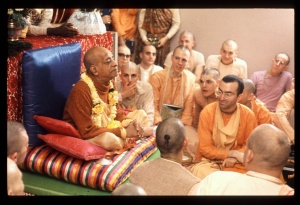CC Antya 6.214: Difference between revisions
m (1 revision(s)) |
No edit summary |
||
| Line 1: | Line 1: | ||
{{ | [[Category:Sri Caitanya-caritamrta - Antya-lila Chapter 06]] | ||
<div style="float:left">'''[[Sri Caitanya-caritamrta|Śrī Caitanya-caritāmṛta]] - [[CC Antya|Antya-līlā]] - [[CC Antya 6|Chapter 6: The Meeting of Śrī Caitanya Mahāprabhu and Raghunatha dasa Gosvāmī]]'''</div> | |||
<div style="float:right">[[File:Go-previous.png|link=CC Antya 6.213|Antya-līlā 6.213]] '''[[CC Antya 6.213|Antya-līlā 6.213]] - [[CC Antya 6.215|Antya-līlā 6.215]]''' [[File:Go-next.png|link=CC Antya 6.215|Antya-līlā 6.215]]</div> | |||
{{CompareVersions|CC|Antya 6.214|CC 1975|CC 1996}} | |||
{{RandomImage}} | |||
==== TEXT 214 ==== | ==== TEXT 214 ==== | ||
<div | <div class="verse"> | ||
āra dina haite | :āra dina haite 'puṣpa-añjali' dekhiyā | ||
siṁha-dvāre khāḍā rahe bhikṣāra lāgiyā | :siṁha-dvāre khāḍā rahe bhikṣāra lāgiyā | ||
</div> | </div> | ||
| Line 12: | Line 16: | ||
==== SYNONYMS ==== | ==== SYNONYMS ==== | ||
<div | <div class="synonyms"> | ||
āra | ''āra dina''—the next day; ''haite''—from; ''puṣpa-añjali''—the ceremony of offering flowers to the Lord; ''dekhiyā''—after seeing; ''siṁha-dvāre''—at the main gate; ''khāḍā rahe''—remains standing; ''bhikṣāra lāgiyā''—for begging some alms. | ||
</div> | </div> | ||
| Line 19: | Line 23: | ||
==== TRANSLATION ==== | ==== TRANSLATION ==== | ||
<div | <div class="translation"> | ||
Beginning from the sixth day, Raghunātha dāsa would stand at the gate known as Siṁha-dvāra to beg alms after the puṣpa-añjali ceremony, in which flowers were offered to the Lord. | Beginning from the sixth day, Raghunātha dāsa would stand at the gate known as Siṁha-dvāra to beg alms after the puṣpa-añjali ceremony, in which flowers were offered to the Lord. | ||
</div> | </div> | ||
__NOTOC__ | |||
<div style="float:right; clear:both;">[[File:Go-previous.png|link=CC Antya 6.213|Antya-līlā 6.213]] '''[[CC Antya 6.213|Antya-līlā 6.213]] - [[CC Antya 6.215|Antya-līlā 6.215]]''' [[File:Go-next.png|link=CC Antya 6.215|Antya-līlā 6.215]]</div> | |||
__NOTOC__ | |||
__NOEDITSECTION__ | |||
Revision as of 07:50, 8 October 2021
Śrī Caitanya-caritāmṛta - Antya-līlā - Chapter 6: The Meeting of Śrī Caitanya Mahāprabhu and Raghunatha dasa Gosvāmī

His Divine Grace
A.C. Bhaktivedanta Swami Prabhupada
A.C. Bhaktivedanta Swami Prabhupada
TEXT 214
- āra dina haite 'puṣpa-añjali' dekhiyā
- siṁha-dvāre khāḍā rahe bhikṣāra lāgiyā
SYNONYMS
āra dina—the next day; haite—from; puṣpa-añjali—the ceremony of offering flowers to the Lord; dekhiyā—after seeing; siṁha-dvāre—at the main gate; khāḍā rahe—remains standing; bhikṣāra lāgiyā—for begging some alms.
TRANSLATION
Beginning from the sixth day, Raghunātha dāsa would stand at the gate known as Siṁha-dvāra to beg alms after the puṣpa-añjali ceremony, in which flowers were offered to the Lord.